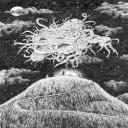Yahoo Answers is shutting down on May 4th, 2021 (Eastern Time) and beginning April 20th, 2021 (Eastern Time) the Yahoo Answers website will be in read-only mode. There will be no changes to other Yahoo properties or services, or your Yahoo account. You can find more information about the Yahoo Answers shutdown and how to download your data on this help page.
Trending News
Writers: What are your thoughts on these 'writers rules'?
Hey guys
Okay, so I've been wandering along reading the 'ten rules for writing fiction' articles on the Guardian website again, and have come across a few other 'rules' that I was wondering what you think for. I know, and I'm sure these writers do to, that there no exact rules for writing, but I was more wondering whether it's advice you're likely to take or not.
As always, answer as little or as many as you wish :)
1) Which are you more likely to agree with:
- Don't wait for inspiration. Discipline is the key. (Esther Freud)?
- Write only when you have something to say. (David Hare)?
2) What are your thoughts on:
- Always carry a notebook. And I mean always. The short-term memory only retains information for three minutes; unless it is committed to paper you can lose an idea for ever. (Will Self)
3) 'Decide when in the day (or night) it best suits you to write, and organise your life accordingly. (Andrew Motion)' - do you think that choosing a time for writing or a place for writing is important to get yourself in 'the zone' or just another excuse to waste time?
4) Which are you more likely to agree with:
- Don't hold on to poor work. If it was bad when it went in the drawer it will be just as bad when it comes out. (Jeanetter Winterson)?
- Remember there is no such thing as nonsense. (Andrew Motion)?
5) Work on a computer that is disconnected from the internet. (Zadie Smith) - not exactly, do you agree with this or not, but rather, do you do this already?
Thank you and I look forward to your answers :)
~ JLT
18 Answers
- 9 years agoFavorite Answer
1) Which are you more likely to agree with:
- Don't wait for inspiration. Discipline is the key. (Esther Freud)?
- Write only when you have something to say. (David Hare)?
I'm siding with Freud. Sure, you need inspiration and imagination to start a story, but discipline is what ends it. If you do it every day, make a habit of it, then even on the days when you're girlfriends just dumped you and you failed an important test, you won't forget to write. And that's what finishes a story.
2) What are your thoughts on:
- Always carry a notebook. And I mean always. The short-term memory only retains information for three minutes; unless it is committed to paper you can lose an idea for ever. (Will Self)
Hahahaha, this is my own personal philosophy! :D I handwrite, you see, and really do carry my notebook everywhere. To school (to write in the break between classes), whenever I travel, to a restaurant to write while waiting for food XD), to the beach...This is excellent advice, and I always abide by it.
3) 'Decide when in the day (or night) it best suits you to write, and organize your life accordingly. (Andrew Motion)' - do you think that choosing a time for writing or a place for writing is important to get yourself in 'the zone' or just another excuse to waste time?
It's an excuse to waste time, in my opinion. What I used to do, I used to tell myself that I couldn't do any more writing past midnight because it was too late and all my writing would come out very well. Boy, was that a half-assed excuse. A couple of days ago I really did get in 'the zone' and stayed up until two. I think I actually wrote the best part of my novel so far. But it's not always like that. Sometimes I write well at school, sometimes at my local cafe...It depends on your state of mind more than anything else.
4) Which are you more likely to agree with:
- Don't hold on to poor work. If it was bad when it went in the drawer it will be just as bad when it comes out. (Jeanetter Winterson)?
- Remember there is no such thing as nonsense. (Andrew Motion)?
Firstly, I'd like to add that this Andrew fellow has an awesome surname, and then I'd like to agree with him. There is bad writing; there is no such thing as bad ideas. Good writing can make even the worst ideas excellent and intriguing, and if I pick up an old, clichéd, Mary Sue-ish story with vampires from when I was 12, who says I can't turn it into something better. I'd kill the Mary Sue, for one, I'd turn the vampires into banshees (because no one appreciates banshees anymore), but I'd keep the original characters and the original plotline.
5) Work on a computer that is disconnected from the internet. (Zadie Smith) - not exactly, do you agree with this or not, but rather, do you do this already?
I don't work on a computer at all. If the Internet is connected, I wind up going to Yahoo! Answers or YouTube, and if the Internet isn't connected, I wind up playing solitaire. Nah, I handwrite, and only use the computer when I need to research something.
Oh, and by the way, Happy Easter to you all!
- UnkurgLv 59 years ago
1) Which are you more likely to agree with:
- Don't wait for inspiration. Discipline is the key. (Esther Freud)?
- Write only when you have something to say. (David Hare)?
95% for the first one. If you wait for inspiration to come, days, weeks, months, and years could go by. I have found that inspiration comes best when I actively chase after it and just write.
2) What are your thoughts on:
- Always carry a notebook. And I mean always. The short-term memory only retains information for three minutes; unless it is committed to paper you can lose an idea for ever. (Will Self)
This is a good idea, no question, but there will always be situations when you cannot carry a notebook. If you get inspiration while swimming, try to depend on short-term memory.
3) 'Decide when in the day (or night) it best suits you to write, and organise your life accordingly. (Andrew Motion)' - do you think that choosing a time for writing or a place for writing is important to get yourself in 'the zone' or just another excuse to waste time?
"Organize your life accordingly." Yeah, right. This is not exactly realistic when you have a job, a family, and a house to care for. I can see myself telling my kids and wife, "Don't bother me. This is my writing time." Oh, sure, that would fly. Honestly, I pretty much know when I will have free time, and I use that to write, but it is never a "set" time.
4) Which are you more likely to agree with:
- Don't hold on to poor work. If it was bad when it went in the drawer it will be just as bad when it comes out. (Jeanetter Winterson)?
- Remember there is no such thing as nonsense. (Andrew Motion)?
First drafts are always "poor" works. If after the tenth or eleventh edit it is still "poor", you may want to consider sending it to the literary graveyard in the recycling bin.
5) Work on a computer that is disconnected from the Âinternet. (Zadie Smith) - not exactly, do you agree with this or not, but rather, do you do this already?
I wish I could bring my old Smith-Corona typewriter back from the dead. Since I can't, the computer it is.
- 9 years ago
1) Which are you more likely to agree with:
- Don't wait for inspiration. Discipline is the key. (Esther Freud)? -- I do agree with this one, sometimes you just have to plod on. Inspiration is an elusive B**** at times.
- Write only when you have something to say. (David Hare)? --Isn't this the same thing as inspiration? Luckily, it's my characters talking, not me.
2) What are your thoughts on:
- Always carry a notebook. And I mean always. The short-term memory only retains information for three minutes; unless it is committed to paper you can lose an idea for ever. (Will Self) -- Yes love this idea. Even a small memo pad you can fit in a pocket or a purse. I've lost some ideas for not having something like that on me.
3) 'Decide when in the day (or night) it best suits you to write, and organise your life accordingly. (Andrew Motion)' - do you think that choosing a time for writing or a place for writing is important to get yourself in 'the zone' or just another excuse to waste time?
--it's another excuse to waist time. You can't always organize your life around writing. Work, family, and education sometimes have to take priority. Sometimes you'll be lucky to get 30 minutes a day in. Though, I personally tend to focus less on 'time' than on a word count. We all have different preferences though, if you can't write with noise, only write at home or somewhere where quiet is enforced. If you thrive in chaos, malls, coffee shops (etc) are your bread and butter.
4) Which are you more likely to agree with:
- Don't hold on to poor work. If it was bad when it went in the drawer it will be just as bad when it comes out. (Jeanetter Winterson)?
--- No I always hold on to work because you can always edit to make it better...or if nothing else to see how far I have come. I think that's horrible advice.
- Remember there is no such thing as nonsense. (Andrew Motion)?
-- I'd say there is such a thing as nonsense, considering that there is some awful writing/plots/stories floating around.
5) Work on a computer that is disconnected from the Âinternet. (Zadie Smith) - not exactly, do you agree with this or not, but rather, do you do this already?
--I do not do this.
- HazelLv 69 years ago
1) Which are you more likely to agree with:
- Don't wait for inspiration. Discipline is the key. (Esther Freud)?
I wholeheartedly agree with this. Inspiration is definitely the key to starting and even planning a story. But I think when it comes down to actually writing the words on paper, inspiration is only a tiny bit of it.
2) What are your thoughts on:
- Always carry a notebook. And I mean always. The short-term memory only retains information for three minutes; unless it is committed to paper you can lose an idea for ever. (Will Self)
Hm. I think it is probably helpful. But I don't think it's completely necessary. If I am struck with an idea that I think is so brilliant that I need to write it down, I'm going to remember it regardless.
3) 'Decide when in the day (or night) it best suits you to write, and organise your life accordingly. (Andrew Motion)' - do you think that choosing a time for writing or a place for writing is important to get yourself in 'the zone' or just another excuse to waste time?
A little of both actually. I do find that I am more productive in certain times of the day. But, I feel limiting myself to just that time of day is an excuse to waste more time. I could be like, oh well it's not two am yet, I guess I can just procrastinate since it's not my time yet. Besides, the more you write only during the time, the harder is will be to break the habit. So I try to write in as many different times a day I can.
4) Which are you more likely to agree with:
- Remember there is no such thing as nonsense. (Andrew Motion)?
Always keep everything. It's all progress. It's nice to look back and see how you've improved. And who knows, perhaps you think it's terrible in one minute get rid of it, and then decide it's not so bad. I never ever throw any of my work away.
5) Work on a computer that is disconnected from the Âinternet. (Zadie Smith) - not exactly, do you agree with this or not, but rather, do you do this already?
I don't. I actually cannot concentrate unless the internet is connected. Whether I am writing or not, I need to have the internet on.
- How do you think about the answers? You can sign in to vote the answer.
- Anonymous9 years ago
1. Write only when you have something to say. But coming up with that requires discipline! So they are both right. This is the "writer's block" dilemma. On the one hand, you don't think your ideas are good enough, so you don't write a thing, waiting for perfection. On the other hand, if you just start writing, it won't be as good as it can be. But that's the whole point of revision. Every good author writes multiple versions of the same story. Rarely is it perfect the first time around. The best thing to do is start writing, and realize that it won't be perfect, and you may even end up scrapping it altogether. But the funny thing is, the more you write and re-write it, the more familiar you become with it, and suddenly the better story comes forward.
2. You don't have to carry a notebook, but it does help. Otherwise, if you have a good idea, you had better be prepared to stop everything and write it down. Sometimes the best ideas come when you're on your way to an important meeting or appointment, and the odds are you will NOT remember it later. At least jot down the basic idea. Having a notebook (or even a cell phone) helps. I sometimes call my own home number and leave a message with the idea. (My husband knows to not delete these. And he gets a kick out of it when it's a song idea and I'm singing it on the message, sometimes with just LA LA LA where the lyrics will go. What's funny is sometimes I'll forget that I even did that, and he'll see me later and say "I really liked that song you came up with this morning.")
3. It depends on you and your expectations. If you find you can't get anything written each week because you don't make the time for it, then by all means, dedicate some time and try to make that work. But a lot of writers feel like that forces them to be in the mood at that specific time. There are realy good studies that show our creative energies are the results of multiple processes in our bodies and our experiences that all flow on different rhythms. It's why some schools use varying schedules for classes (A, B, C), where math is period 1 on Monday, 5 on Tuesday, and 7 on Wednesday, then 1 again on Thursday, etc. They found that students learn better when the time periods are switched around. For me, I write when I'm in the mood. Sometimes it's 3 days in a row, other times it's once every 3 weeks!
4. I agree to a point. Yes, if it was bad before, it's not going to suddenly become better. However, I've had plenty of old stories that went no where and suddenly when I read them later, I realize exactly what was wrong with them and NOW I know how to make them better! In fact, there are times I WISH I had a lot of older stories I threw away because I would love to rewrite them now, now that I know more about writing. Ask any artist what they think of their older paintings or works, and a lot of them will look at them with disgust, because years and years later they see every flaw and problem. But, at the time, those same works may have earned all kinds of praise. Then again, it's not unheard of for artists to take a knife to old paintings or smash bad works. So it's a personal preference. I still have a painting that I did when I was 5! It's actually pretty fun to look at.
5. If you're easily distracted (and who isn't), I'd agree. I didn't plan on writing today, but DID have something else on my list... and here I am on Yahoo Answers! Ha ha! But I needed a break.
- 9 years ago
1) Which are you more likely to agree with:
---"Write only when you have something to say." I do agree with both sayings, because both are important to being a writer. But I think part of being a writer is having the passion for it, not forcing yourself to have the passion.
2) What are your thoughts on:
- Always carry a notebook. And I mean always. The short-term memory only retains information for three minutes; unless it is committed to paper you can lose an idea for ever. (Will Self)
---I think it's not so much important to have a notebook as it is to have paper & pen available. At school, I always have that. At home, I always have that. But other than that, I don't go out much and it's not really necessary for me to have a notebook in hand. And if I do think of an idea, I sometimes just keep developing it in my head and I then I don't forget it because it's on my mind.
3) 'Decide when in the day (or night) it best suits you to write, and organise your life accordingly. (Andrew Motion)' - do you think that choosing a time for writing or a place for writing is important to get yourself in 'the zone' or just another excuse to waste time?
---I've learned that I'm not a schedule person (however, I love organizing and creating schedules). Personally, they waste time for me.
4) Which are you more likely to agree with:
- Don't hold on to poor work. If it was bad when it went in the drawer it will be just as bad when it comes out. (Jeanetter Winterson)?
- Remember there is no such thing as nonsense. (Andrew Motion)?
---Ah, I agree with neither of them. First off, nonsense is the coolest. Second of all, I keep most of my writing. I like to look back on it and I think it gives helps my eye for what not to do in writing. Because I realize my old work is awful XD
5) Work on a computer that is disconnected from the Âinternet. (Zadie Smith) - not exactly, do you agree with this or not, but rather, do you do this already?
---Sometimes, I'd agree to this. Today I wrote on the computer with internet connection and then in my room in silence. I got about the same amount of work done both ways. The internet did distract me, but listening to music on it helped me stay awake. When I went to my room and wrote in a notebook, I fell asleep for thirty minutes after a couple pages worth of writing. Not that writing bores me - I just got six hours of sleep last night. Which is rather stupid because I could've slept in if I wanted P: In fact, I usually fall asleep when I do something in my room. Even if I'm on the floor, haha.
- dracironLv 79 years ago
1 - I tend to agree with Write when your muse is ready. I've butchered some of my work trying to force myself to write when the muse was absent having to remove all the work I did. However those lucky enough to get paid to write don't have that luxury and will at times have to write when the Muse is on vacation.
2. While I personally don't do it I should. Doesn't have to be a notebook. A voice recording device of some sort for many is much better. Depends if your more abstract or verbal in your thinking. I do keep a notepad by my bed as so many ideas come when I'm half asleep. So I'd say #2 would be a good strong suggestion but not rule.
3. Is an excellent suggestion.
4. Shrug I tend to keep it unless it's really bad. Sometimes you can salvage pages and use them for a new better work. Most of the time yeah if it's really bad flush it.
5. Disagree strongly. I use the net too heavily in writing. If I want to visualize something quick google search. If I want to look up a piece of folklore or do research for non-fiction internet. The key of this is do not get distracted. So instead of disconnected shut down email, IM and other forms of contact.
- Kathryn WLv 79 years ago
1) Which are you more likely to agree with:
- Don't wait for inspiration. Discipline is the key. (Esther Freud)?
- Write only when you have something to say. (David Hare)?
Hmm. I'm not sure that I agree with either of these statements. I think you need a little of both. You need to have something to say before you can write. But you also need to give yourself time to write it.
2) What are your thoughts on:
- Always carry a notebook. And I mean always. The short-term memory only retains information for three minutes; unless it is committed to paper you can lose an idea for ever. (Will Self)
I obviously have a longer memory and more fertile imagination than that guy.
That said, I don't have a notebook as such, but I'm guilty of jotting down any thoughts or ideas I might have about my current story inside my diary/organiser. Usually little things that just occur to me during the course of my day - for example while I'm drinking coffee I might come up with the perfect name for the restaurant in my story. A typical day in my organiser looks like this:
10am - Visit market. Bread, milk, stockings, metroticket.
12pm - Meeting with manager.
7pm - Coffee with Ange.
NAME FOR ALL U CAN EAT RESTAURANT - "GET STUFFED".
(Yeah, okay, I've never really named a fictional restaurant something as crass as Get Stuffed. But I might one day, if I write a book for ten year old boys.)
Anyway, my point is, sometimes I write down smaller details before they are forgotten. I seem to be able to remember bigger ideas without a prompt.
3) 'Decide when in the day (or night) it best suits you to write, and organise your life accordingly. (Andrew Motion)' - do you think that choosing a time for writing or a place for writing is important to get yourself in 'the zone' or just another excuse to waste time?
Hmm. As I've gotten older and more set in my ways, I've found that I've naturally started setting aside a certain portion of my evenings to write. I find it easier to write when I'm tired--my inner critic switches off, giving me a free run with my work without worrying about how rough the draft is. I prefer to edit and research in the mornings, when I'm in a different frame of mind. I think after doing this for so many years I know what works best for me.
4) Which are you more likely to agree with:
- Don't hold on to poor work. If it was bad when it went in the drawer it will be just as bad when it comes out. (Jeanetter Winterson)?
- Remember there is no such thing as nonsense. (Andrew Motion)?
More often than not, a terrible manuscript can have at least one or two good things about it, even if it is awful in its current form. Recently, I just finished writing a manuscript where the main character was the same minor character that appeared in an awful, unpublishable manuscript from 2002 that I found filed away. So even though the 2002 manuscript was awful as a whole, it had one good thing about it that I was able to take and use elsewhere.
That said, there are times when I do cull my files. The trick is to know what to hold on to and what to throw away.
Ultimately I agree with the statement "Remember there is no such thing as nonsense" though.
5) Work on a computer that is disconnected from the Âinternet. (Zadie Smith) - not exactly, do you agree with this or not, but rather, do you do this already?
If I don't want to be distracted, definitely. And I'll put my phone just out of reach as well.
Other times, the internet can be a useful tool for research purposes, or for those moments when the story really isn't coming together and I need to talk to other writers.
PS I've started a new blog, about my writing adventures and some of the books that I read. Feel free to check it out: http://kathrynwhiteauthor.blogspot.com/
- 9 years ago
1. I agree with both. When it comes to ideas, inspiration is the most important thing, but when you're just writing a chapter or a paragraph, discipline is important.
2. I agree with Will. I always have my notebook, just in case an idea walks along.
3. I write whenever I can, no matter what I'm doing.
4. I think that poor work can be edited and made better.
5. I never do that XD
- 9 years ago
1. Both. Inspiration is what starts a story, but (unless it's short enough to finish in a week or less) discipline is what finishes it.
2. I used to be obsessive about carrying a notebook, but now I don't bother. Having said that, I'm seldom more than a couple of minutes' walk from a computer. I'm not too fussed about holding on to individual ideas; I've already written down enough to last for at least the next five years. I find that my ideas are rarely unchanged between the first draft and publication, so it doesn't matter whether I write them down as soon as they come to me. And no matter how brilliant they are, if they don't fit with the rest of the story, they don't belong there.
3. Routine and familiarity are important in building discipline (see item 1), which builds consistency as to how much you write and how good it is. This doesn't mean you have an excuse to waste hours or days looking for the perfect place to write, or making your room perfect. The important thing is to find somewhere that has no distractions or (more likely) where any distractions are OK to ignore until you're taking a break.
4. I'm somewhere in between. Computer storage is so cheap now that deciding what to keep and what to delete just isn't worth the time it takes. But not everything you write deserves to be published, or even read by anyone else.
5. If you can afford a computer just for writing, and have the room for it, that's probably not a bad idea. I've lost count of how many hours I've wasted on the web when I should've been writing. I compromise by shutting down my web browser when I'm writing. Whenever I'm trying to think what to write next, I find myself thinking, "Maybe I'll check Y!A or Facebook instead," but if my browser isn't running, the thought of having to wait for the browser to start is enough to send me back to the wordprocessor.






![Jen[Chocolate Burn]'s avatar](https://s.yimg.com/ag/images/4634/37711632723_69bb13_128sq.jpg)

![Silly Turtle [Dont forget about the avocados]'s avatar](https://s.yimg.com/ag/images/4521/38732366816_b8024d_128sq.jpg)



